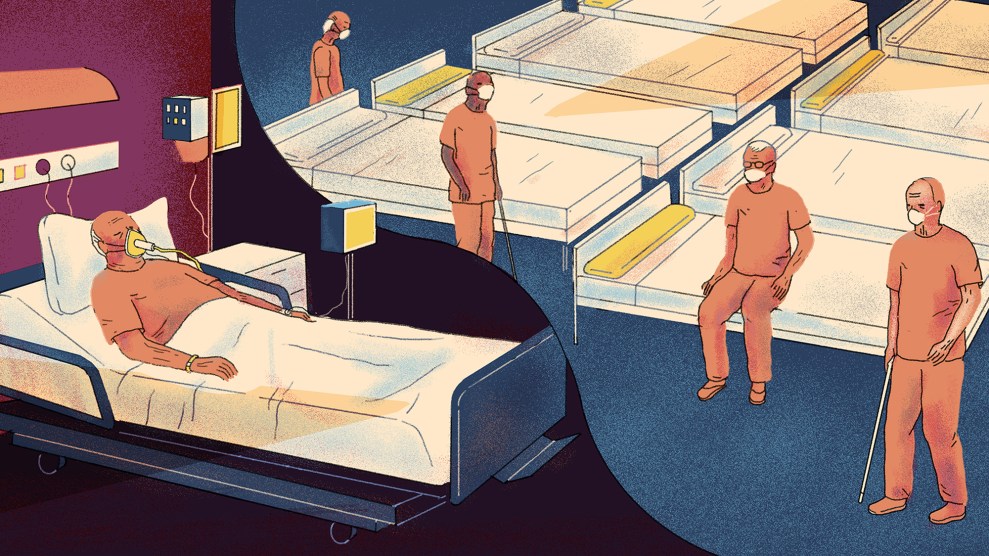
I’m a teacher in a federal prison in Tallahassee, Florida. I started off as a correctional officer, but I wanted to do something that was gonna have a more lasting effect: When I see students get their GED who’ve had the world against them, who never thought they’d achieve graduating, it really means a lot. And that’s normally their step to doing something better. I’ve seen so many people go from “I can’t get past the third-grade level” to enrolling in college correspondence courses. That’s the rewarding factor for me.
The issue a lot of my co-workers and I run into is that the bosses in DC, the supervisors in a position to make decisions, are out of touch. A lot of these inmates, the first time they are exposed to a computer is when they try to take the GED test. It is timed. And the problem is, there are very few institutions that have computer keyboarding classes. A lot of our resume-writing classes are done on typewriters. These typewriters are old. I have inmates instead writing handwritten resumes because the typewriters break, the buttons break, because it’s not as sturdy as a regular computer.
So it’s crippling that our GED system has now gone to computer-based testing. That automatically puts them at a disadvantage.
The agency likes to cite security concerns about computers, but there are ways to set up typing classes that aren’t linked to the outside internet. It can be done. The money isn’t being spent to allow it.
I work at a facility where we have an actual computer lab that has been shut down for a long time. Monitors and keyboards are just sitting there because there are no programs on those monitors that the inmate population can use.
I have tried on several occasions to bring things to the attention of management. I’ve been told, “You don’t have to be the smartest person in the room.” And I was told by an associate warden, “You’ll never advance in your career if you don’t learn the politics of what’s going on.” And I was like, what in the world does that mean? There’s no politics in saying, “We need A, B, and C, and this is how we can get them. This is where we can cut back.” But you get so much pushback.
They have this program called Ideas Are Dollars, and staffers could submit ideas, and if your idea was taken, you’d get an award. But nobody’s really doing that anymore. It’s hard to submit things because of the pushback. You’re considered a know-it-all. You’re considered out of touch with management. And then, you know, I sit and see managers spend money on laptops for themselves, or big-screen TVs. Every warden has a TV in their office. Every warden has a laptop. It’s not trickling down. One of the biggest expenditures is travel for directors and assistant directors in Washington, DC. It’s like, if you guys could have a meeting through Zoom or video, we could cut out half the travel budget and allocate that money back into the field.
I had a student who had been in the GED class for 14 years. He kept getting hung up on the testing, a point or two away, and the computer testing system really set him back. Luckily, he had some tenacity to get through it. But I mean, I couldn’t give you the number of times that somebody misses a test by a small margin. And the inmates don’t even try to do the essay portion because they know they don’t have the time. They don’t have the skills necessary to type the essay. So they try to make up points in other areas. That happens every day. And I tell them, “Put something in there. You’ll get something for something as opposed to nothing.” But that’s just a general rule among the inmate population: “Don’t waste your time with the essay portion.”
That’s pretty much a systemwide problem. There may be a couple of institutions that have keyboarding programs, probably contracted through a local college, but basically that’s a systemwide problem. Keeping up with the technology is tough for whatever reason.
It’s problematic in other ways, in the sense that the inmate population is familiar with the First Step Act. It says we should be offering all the programming we can and giving them credit for those courses that would advance them into society, like computer courses, programming courses, resume-writing courses, occupational training programs. And so they’re constantly asking staff, “What about this program? What about that program?” And the program basically doesn’t exist. I don’t know whether we’re telling Congress these things exist. But a lot of these programs either don’t exist, they’re depleted, or they’re not getting the proper funding. So it looks like they’re there on paper—it looks like the institution has GED, horticulture, culinary arts, custodial maintenance, all these vocational trades and apprenticeships. But if you actually go into the system, you’ll see no inmates are enrolled because a lot of them don’t have teachers.
Like, a big part of the First Step Act is dyslexia screening because a large part of our prison population has dyslexia. And the only people who can administer dyslexia testing are teachers who are certified, but it’s super hard to find any because management won’t put the resources there to offer an incentive or to give them the pay or whatever the case may be. So not only do you not have the materials but you don’t have the staff. But we’re checking boxes, saying, “Hey, dyslexia testing is getting done.” And that’s not necessarily the case.
If you look at the Bureau of Prisons, you’ll see there’s a lot of old-boy-network things going on. They hire their friends or relocate the ones who don’t agree with their way of thinking. That’s what I think about when I think about bosses: the administrative decisions being made. Year after year, the BOP is given more money through the congressional budget, but we end up having more issues. If we’re given more money, why aren’t we able to get staff? Why aren’t we able to provide adequate programming that fits the generation we’re currently in, the millennials, to help them get out and be productive citizens? Instead they’re using it to transfer their friends to higher levels in the BOP.
We have a good warden now but she’s not given the resources she needs. She’s a little more open-minded, but the rest of them, there’s just always been trouble. Some of the wardens or associate wardens before her were caught in sex scandals or drinking scandals, scandals that plague the bureau all the time among executive staff but are usually swept under the rug. It’s the culture in the bureau: What you can’t get away with, they can. You know, things that would jeopardize the average employee’s job or career mobility. There’s a phrase we use in the bureau: “F up, move up.” And that’s kind of how things go: You screw up and you’re promoted. So what you get is a bunch of screwups at the top making decisions that are out of touch with what’s actually going down on the ground.
This story is part of our Bad Bosses project, a reported collection of accounts from workers about their terrible bosses and the system that creates them. You can read more about the entire project and find every story here. Annotations—highlighted throughout—can be clicked for further context and comment from other parties. Got your own bad boss story? Send us an email.















